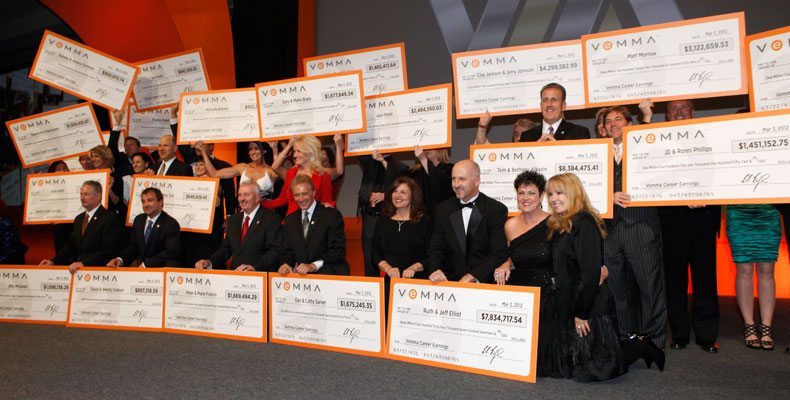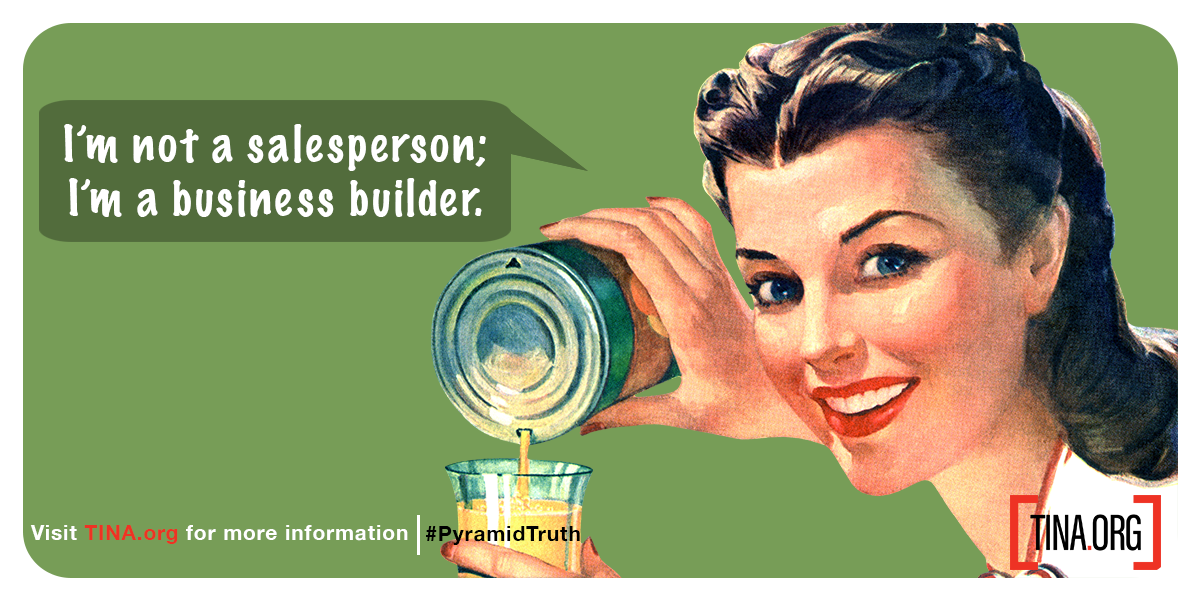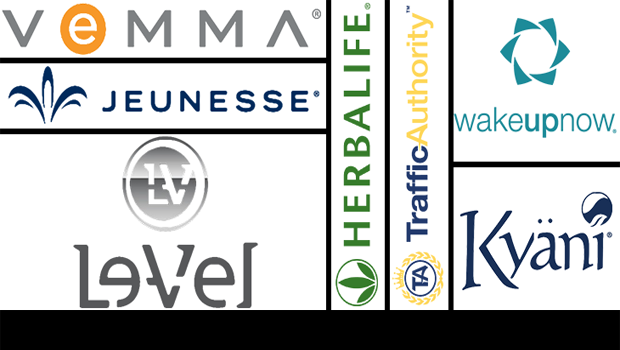
The Fundamental Takeaway from FTC v Vemma
Vemma settlement clarifies FTC’s position on what constitutes a legitimate MLM.
Former FTC economist outlines issues with new "anti-pyramid" bill.
| Peter Vander Nat, Ph.D.
Make no mistake about this: if HR 3409 (the “bill”) is enacted into law, the authority of the Federal Trade Commission (FTC) to prosecute pyramid schemes will be essentially nullified. Only an operation foolish enough to pay headhunting commissions for recruiting new participants could be subject to FTC prosecution. Just about any pyramid scheme that is a bit more clever than that would likely be protected from prosecution under the bill, which is ironically dubbed the Anti-promotional Pyramid Scheme Act of 2017.
The purpose of this opposition statement is to present and analyze the most objectionable elements of HR 3409. I highlight the objectionable language first, and proceed to the Bill’s version of “ultimate use” as it purports to function as certain historic legal language supporting the legislation. I continue with the Bill’s peculiar definition of “inventory loading” and how it actually permits an operation that the FTC and federal courts have consistently rendered a pyramid scheme.
First, a very objectionable formulation is found in Section 2(c), which states:
Nothing in this Act may be construed to prohibit a plan or operation, or to define a plan or operation as a pyramid promotional scheme, based upon the fact that participants in the plan or operation give consideration in return for the right to receive compensation based upon purchases of goods or services or intangible property by participants for personal use, consumption, or resale so long as the plan or operation does not require inventory loading and the plan or operation implements a bona fide inventory repurchase agreement.
Evidently, as long as the operation does not require inventory loading as defined by this bill and participant compensation is based upon purchases of goods or services for personal use, consumption, or resale ─ any of these ─ then this Act would permit the operation as legal.
A further objectionable provision is in Section 3 Definitions, where the bill states:
‘Pyramid promotional scheme’ means any plan or operation in which individuals pay consideration for the right to receive compensation that is based upon recruiting other individuals into the plan or operation rather than primarily related to the sale of products or services to ultimate users.
‘Ultimate user’ means, with respect to a product or service sold by a plan or operation, an individual who consumes or uses the product or service, whether or not the individual is a participant in the plan or operation.
Although this delineation of a pyramid scheme sounds like language employed in Koscot (1975) and BurnLounge (2014), it does not faithfully reflect those decisions. Sections 2(c) coupled with the bill’s stated definitions render the outcome that participant purchases, as long as they avoid inventory loading, constitute ultimate use and are thus not part of a pyramid scheme operation. Koscot and its subsequent federal court review by Omnitrition (1996) and BurnLounge (2011, 2014), as well as other federal decisions, did not say that at all. In fact, they reaffirmed the need for sales to consumers outside the participant network.
Ultimate Use Under HR 3409
As true of HR 5230 in 2016, the bill’s language seeks to enact into law the position of the Direct Selling Association (DSA) and stated by its President, Mr. Mariano: “the legal analysis should be: is the product being used by real consumers? Whether the consumer is a distributor is immaterial.” Equivalently, participant purchases for internal consumption that avoid inventory loading are permitted, and such internal consumption does not make a company a pyramid scheme. Most importantly, Vemma (2016) and BurnLounge (2011, 2014) ─ both being pyramid scheme exemplars ─ could not have been prosecuted as pyramid schemes under the bill’s full set of provisions.
Regarding case law, the 9th circuit court decision in 2014 regarding BurnLounge is used by the DSA in support of its position on ultimate use:
BurnLounge is correct that when participants bought packages in part for internal consumption…the participants were the ‘ultimate users’ of the merchandise and that this internal sale alone does not make BurnLounge a pyramid scheme.
But the DSA ignores the fuller passage of the court’s ruling from which the above sentences are drawn. The fully relevant passage is:
BurnLounge is correct that when participants bought packages in part for internal consumption…the participants were the ‘ultimate users’ of the merchandise and that this internal sale alone does not make BurnLounge a pyramid scheme. But it is incorrect to conclude that all rewards paid on these sales were related to the sale of products to ultimate users… Whether the rewards are related to the sale of products depends on how BurnLounge’s bonus structure operated in practice. … In practice, the rewards BurnLounge paid for package sales were not tied to the consumer demand for the merchandise in the packages; they were paid to Moguls for recruiting new participants. … Rewards for recruiting were ‘unrelated’ to sales to ultimate users because BurnLounge incentivized recruiting participants, not product sales. The FTC and other courts have consistently applied the Omnitrition test in this way.
The circuit court considers the system of participant rewards and determines what that system incentivizes. The court allows that participant purchases for personal use fall within ultimate use, and it still finds that the participant rewards paid by BurnLounge for package sales were not tied to consumer demand; in fact, the rewards for recruiting were “unrelated” to sales to ultimate users because BurnLounge incentivized recruiting participants, not product sales.
The language of HR 3409 renders such analysis as immaterial (as in “whether the consumer is a distributor is immaterial”). An organization in which all product sales/purchases are internal to the participant network, thus with zero sales to non-participants, and even adding that this outcome is envisioned and secured by the incentives built into the compensation plan, could not be prosecuted as a pyramid scheme under the bill as long as it avoids “inventory loading.”
Inventory Loading Under HR 3409
Section 3 of HR 3409 defines inventory loading as a practice in which a plan or operation:
The second component, i.e., “is not subject to a bona fide repurchase agreement,” is new and I am not aware of any other formulation in which that condition is made part of the definition of inventory loading. A more common meaning is given along the lines noted by the court in Omnitrition (1996): “Inventory loading’ occurs when distributors make the minimum required purchases to receive recruitment-based bonuses without reselling the products to consumers.” And in close proximity, the court adds: “Where, as here [Omnitrition], a distribution program appears to meet the Koscot definition of a pyramid scheme, there must be evidence that the program’s safeguards are enforced and actually serve to deter inventory loading and encourage retail sales.”
Note a serious wrinkle, surely intended, by adding the second component. Consider a company within the scope of the bill (a business that offers a product or service to consumers other than a “permanent retail establishment” via Section 2) and suppose it creates a compensation plan incentivizing purchases definitely beyond what a participant could expect to use, consume, or resell, and this same plan offers a genuine repurchase agreement. Such an operation could not be engaged in “inventory loading” as defined by the bill because the plan does not meet the second component. And having thereby avoided inventory loading, such a plan or operation cannot be rendered a “pyramid promotional scheme” under Section 2(c).
As though the above carve-out is not yet enough in permitting a pyramid scheme operation, the bill further delineates two categories of product or services: those that are subject to the company’s repurchase agreement and those that are not. Specifically, the bill states within Section 3 Definitions:
‘Current and marketable’… does not include inventory that has been clearly described by a plan or operation to a participant prior to purchase as discounted, seasonal, a special promotion item, or not subject to the plan or operation’s inventory repurchase program.
A number of subcategories are specified here, remarkably including this one: inventory clearly described prior to a participant’s purchase as not being subject to the plan or operation’s inventory repurchase program. What proportion of product or services might the latter category comprise? The bill is silent on this sweeping carve-out.
For participants who decide to quit, which is the only circumstance in which the refund policy becomes applicable under Section 3(1), their residual inventory is likely to be a very small part of all those purchases made in an effort to advance up the ladder of positions in the operation’s pay plan. Clearly, the bill does not provide consumer protection against incentivizing participant purchases beyond what could be used, consumed, or resold; i.e., there is no consumer protection against inventory loading as normally understood.
HR 3409 Would Have Let BurnLounge and Vemma off the Hook
In relation to this analysis of the bill, it is notable that BurnLounge and Vemma ─ both placed under federal court orders to prevent a pyramid scheme operation ─ did not involve inventory loading, whether in a normal sense noted by the Omnitrition court or in the peculiar sense of the bill.
BurnLounge
In order to stay active for compensation purposes, BurnLounge participants (“Moguls”) needed to purchase two albums a month of digital music, the main product, with each album at $9.95. Also, to maintain Mogul status, a participant paid an $8 monthly fee for which the purchaser received promotional information about the company’s digital music selections ─ so, all in all, less than $28/month of required monthly purchases. Also, upon joining the income opportunity, a Mogul paid an initial enrollment fee of less than $50 and made a single purchase of one of three enrollment packages (basic, premium, or VIP), ranging from $50–$400, with the VIP package most strongly promoted and also the one that gave the largest rewards for subsequently enrolling further Moguls into the income opportunity.
The defense submitted expert testimony that the VIP package was a real bargain; it had a $1,000 consumption value! As part of its ruling, the federal court (2011) found the defense expert’s testimony not even “remotely persuasive.” In view of the actual dollar figures involved, the case did not involve inventory loading in a conventional sense. Also, regarding the bill’s stricture against inventory loading, the one-time enrollment package was not inventory; it could not be resold and each participant had to buy their own enrollment package. And the required two music albums a month surely would not have exceeded what a person could use, consume or resell. By avoiding inventory loading, BurnLounge could not have been prosecuted under the bill as a “pyramid promotional scheme.”
But two federal courts found BurnLounge to be a pyramid scheme. The company was placed under an order in 2014 that removed its pyramid scheme compensation plan and allowed it to sell product to general consumers. BurnLounge experienced market failure and closed its operation in 2015– not really a surprise in view of the 2014 finding that participant rewards were not tied to consumer demand.
Vemma and Commissions on Participant Personal Consumption
I believe that the payment of a commission on a participant’s personal consumption need not be objectionable by itself. To evaluate such commissions, the FTC and the courts have considered the company’s full compensation plan and, as emphasized above, what this plan fundamentally incentivizes. Consider an outcome in which commissions on personal consumption comprise the driving force of the proposed opportunity. An obvious problem develops ─ an exemplar being the FTC’s case against Vemma (2015-2016).
Vemma’s compensation plan incentivized, and was based on, the notion that each participant enrolls two others who are, or become, “bonus-qualified” i.e., purchase the requisite amount of monthly product to qualify for commissions. The dominant rewards paid out by Vemma were exactly rewards tied to being bonus-qualified with no relationship to sales to non-participants. So, commissions on personal consumption comprised the driving force of Vemma’s income opportunity.
As more fully set forth in the Fundamental Takeaway of FTC v. Vemma, this compensation plan provided no incentives for sales to people outside the income opportunity and the data showed such sales to be very small compared to all product sales. Whether under the meaning stated in Omnitrition (reviewed above) or under the caveats of the bill, this case did not involve inventory loading, as participants did not buy inventory. Again, by thereby avoiding inventory loading, it could not have been prosecuted as a pyramid scheme under the terms of the bill.
But the FTC prosecuted Vemma as pyramid scheme, and the company is now under a federal court order that has eviscerated its pyramid compensation plan. In her speech to the DSA, (then) Chairman Ramirez reiterates that an important part of a legitimate enterprise is a compensation system that is not funded primarily by participant purchases undertaken to meet qualifications for rewards. And the 2004 FTC Advisory had already said the very same.
Under the terms of the bill, BurnLounge, Vemma, and a number of other cases over the past 40 years could not have been prosecuted as pyramid schemes and leave just misrepresentations of income as prosecutable under the bill (if they occurred and could be proven to be such). By its design, HR 3409 would ensure that a consistent application of controlling case law regarding pyramid schemes could not continue in the future. I hope that members of Congress upon reviewing this bill will see it for what it really is: The Pyramid Promotional Act of 2017.
Vemma settlement clarifies FTC’s position on what constitutes a legitimate MLM.
Readers have told us to look into these MLMs.
Upon reading the transcript of the Sept. 15 court hearing re Vemma, which conveys the most unusual meanings that Vemma attributes to such common terms as customer, business opportunity, and…


